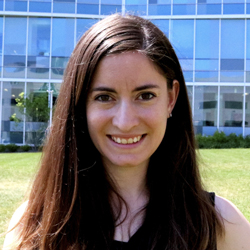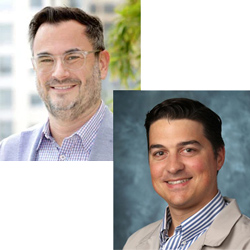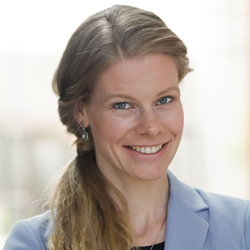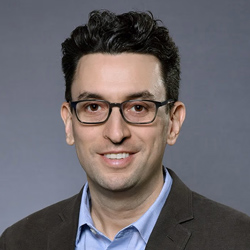Events
Past Event
WED@NICO SEMINAR: Caterina Gratton, Northwestern Dept of Psychology "Functional Networks and Hubs in the Human Brain"
Northwestern Institute on Complex Systems (NICO)
12:00 PM
//
Lower Level, Chambers Hall
Details

Speaker:
Caterina Gratton, Assistant Professor, Department of Psychology, Weinberg College of Arts and Sciences, Northwestern University
Title:
Functional Networks and Hubs in the Human Brain
Abstract:
The human brain is organized into large-scale networks, or systems, of interacting brain regions. These interactions can be measured in living humans with functional Magnetic Resonance Imaging (fMRI), by measuring correlations in the patterns of activity between different regions. Increasingly sophisticated techniques enable the mapping of brain networks at unprecedented levels of detail, but many questions still remain. In this presentation, I will tackle three recent studies that we have undertaken to better understand human functional brain networks and their contributions to brain function. In the first study, we examine whether the topology of brain networks – specifically, the presence of connector hub regions – is important for brain function, by examining the consequences of damage to these regions. In the second study, we examine the variability in brain networks within and across subjects at different time-scales. Finally, I will present on very recent work, looking in detail at the characteristics of individual differences in brain networks. Jointly, these studies suggest that network topology has important implications for human brain function, and that measures of network organization are stable features that can be used to measure trait-like variability in brain organization.
Speaker Bio:
Dr. Gratton is currently an Assistant Professor in the Psychology Department at Northwestern University, with a secondary appointment in the Department of Neurology and affiliations with the NUIN and the Cognitive Science Program. Dr. Gratton received her B.S. from the University of Illinois in Psychology and Neuroscience and her Ph.D. in Neuroscience from the University of California, Berkeley, where she worked with Mark D’Esposito and Michael Silver. Afterward, she was a postdoctoral fellow with Steve Petersen at Washington University in St. Louis. Dr. Gratton is interested in large-scale brain networks and how they give rise to complex human behaviors. Her research program seeks to characterize how human brain networks are organized, how they contribute to the myriad goal-directed behaviors that are essential to our daily lives, and how these processes break down with damage and disease. In her work, she employs a variety of methodologies, including functional magnetic resonance imaging (fMRI) and electroencephalography (EEG) to track the spatial and dynamic characteristics of brain activity, and transcranial magnetic stimulation (TMS), recordings from patient populations, and pharmacological manipulations to study perturbations of brain systems.
Live Stream:
Time
Wednesday, April 3, 2019 at 12:00 PM - 1:00 PM
Location
Lower Level, Chambers Hall Map
Contact
Calendar
Northwestern Institute on Complex Systems (NICO)
WED@NICO SEMINAR: Todd Florin and Nelson Sanchez-Pinto, Lurie Children's Hospital of Chicago "Transforming Research and Innovation for Acutely Ill Children"
Northwestern Institute on Complex Systems (NICO)
12:00 PM
//
Lower Level, Chambers Hall
Details

Speakers:
Todd Florin, MD, MSCE, Associate Division Head for Academic Affairs & Research, Division of Emergency Medicine, Ann & Robert H. Lurie Children’s Hospital of Chicago; Professor of Pediatrics (Emergency Medicine), Northwestern University Feinberg School of Medicine
L. Nelson Sanchez-Pinto, MD, MBI, Attending Physician, Critical Care, Ann & Robert Lurie Children’s Hospital of Chicago; Associate Professor of Pediatrics (Critical Care) and Preventive Medicine (Health and Biomedical Informatics), Northwestern University Feinberg School of Medicine
Title:
Transforming Research and Innovation for Acutely Ill Children
Abstract:
We will present an overview of the new Center for Pediatric Acute and Critical Care Research and Innovation (PACCRI) at Lurie Children's Hospital and its goal of fostering and facilitating ambitious, high-risk/high-reward research collaboration between clinicians and engineers, computer scientists, and data scientists. We will present two areas of active research by PACCRI faculty that may overlap with NICO faculty expertise: (1) predicting pneumonia in the emergency department, and (2) modeling hospital strain and resource allocation to prevent patient deterioration.
Speaker Bios:
Dr. Todd Florin is Professor of Pediatrics in the Division of Pediatric Emergency Medicine at Lurie Children’s Hospital of Chicago and Northwestern University Feinberg School of Medicine. He is Associate Division Chief for Academic Affairs & Research for the Division of Emergency Medicine at Lurie, Scientific Director of Research Development at Stanley Manne Children’s Research Institute, and Co-Director of PACCRI. Dr. Florin's research program aims to improve the diagnosis, management and outcomes of children with common, serious infections, with a current focus on lower respiratory tract infections. Complex challenges that Dr. Florin is tackling include heterogeneous and ill-defined phenotypes, lack of readily measurable reference standards, and unreliable clinical measurements. Current work centers on development of risk stratification tools and use of biomarkers to predict and improve outcomes in children with pneumonia at the point-of-care. His work has also centered on resource utilization, variation in care, antimicrobial stewardship, and use of clinical trials to improve treatments for respiratory tract infections in children. He is PI of an R01 from NHLBI to develop and validate a pediatric pneumonia risk score across 14 pediatric emergency departments, in addition to Co-PI of a 19-site clinical trial evaluating antibiotic treatment strategies in children with pneumonia funded by PCORI. He is co-PI on 2 multinational prospective cohort studies through the Pediatric Emergency Research Network (PERN) - one focused on pneumonia and the other on COVID-19 in children presenting for emergency care.
Dr. Nelson Sanchez-Pinto, MD, MBI, is a pediatric critical care physician and clinical informatics specialist. He is an Associate Professor of Pediatrics (Division of Critical Care) and Preventive Medicine (Division of Biostatistics and Informatics) at Northwestern University and Ann & Robert H. Lurie Children’s Hospital of Chicago. His NIH-funded research focuses on applying data science and informatics tools to improve the care of children with sepsis and other acute and critical care conditions. He leads several large-scale data sharing initiatives and data collaboration projects both nationally and internationally, including co-leading the team that derived and validated the new Phoenix criteria for sepsis in children. He is one of the founders and past chairs of the PICU Data Collaborative, which collects granular, anonymized electronic health record data from critically ill children from 26 institutions in the US.
Location:
In person: Chambers Hall, 600 Foster Street, Lower Level
Remote option: https://northwestern.zoom.us/j/92586384543
PW: NICO26
About the Speaker Series:
Wednesdays@NICO is a vibrant weekly seminar series focusing broadly on the topics of complex systems, data science and network science. It brings together attendees ranging from graduate students to senior faculty who span all of the schools across Northwestern, from applied math to sociology to biology and every discipline in-between. Please visit: https://bit.ly/WedatNICO for information on future speakers.
Time
Wednesday, February 25, 2026 at 12:00 PM - 1:00 PM
Location
Lower Level, Chambers Hall Map
Contact
Calendar
Northwestern Institute on Complex Systems (NICO)
WED@NICO SEMINAR: Ágnes Horvát, Northwestern School of Communication
Northwestern Institute on Complex Systems (NICO)
12:00 PM
//
Lower Level, Chambers Hall
Details

Speaker:
Ágnes Horvát, Associate Professor, Department of Communication Studies, Northwestern School of Communication
Title:
TBA
Abstract:
TBA
Speaker Bio:
Ágnes Horvát is an Associate Professor in the Department of Communication Studies, (by courtesy) the Computer Science Department of the McCormick School of Engineering, and (also by courtesy) the Department of Management and Organizations of the Kellogg School of Management.
Her research seeks to measure, understand, and forecast the collective behaviour of networked crowds in large-scale socio-technical systems. On the one hand, her current projects investigate the impact of network embeddedness and diversity on scholarly communication. On the other hand, she works on identifying expressions of collective intelligence and opportunities for innovation in crowdsourcing communities. Her research group also develops empirical and theoretical methods to support creativity and predict success in culture industries. This work lies at the intersection of computational social science and social computing. It uses an interdisciplinary data-driven approach that builds on techniques from network science, machine learning, and statistics.
Location:
In person: Chambers Hall, 600 Foster Street, Lower Level
Remote option: https://northwestern.zoom.us/j/96701776160
PW: NICO26
About the Speaker Series:
Wednesdays@NICO is a vibrant weekly seminar series focusing broadly on the topics of complex systems, data science and network science. It brings together attendees ranging from graduate students to senior faculty who span all of the schools across Northwestern, from applied math to sociology to biology and every discipline in-between. Please visit: https://bit.ly/WedatNICO for information on future speakers.
Time
Wednesday, March 4, 2026 at 12:00 PM - 1:00 PM
Location
Lower Level, Chambers Hall Map
Contact
Calendar
Northwestern Institute on Complex Systems (NICO)
WED@NICO SEMINAR: Steven Franconeri, Northwestern University "Point Taken: A gamified Intervention that Creates Enlightened Disagreements"
Northwestern Institute on Complex Systems (NICO)
12:00 PM
//
Lower Level, Chambers Hall
Details

Speaker:
Steven Franconeri, Professor of Psychology, Weinberg College of Arts & Sciences; Professor of Management and Organizations, Kellogg School of Management, Northwestern University
Title:
Point Taken: A gamified Intervention that Creates Enlightened Disagreements
Abstract:
Should we drop standardized testing for college or Ph.D. admissions? Allow athletes to join teams based on gender identity? When organizational and public policies bind behavior, human coexistence requires a way to determine that collective policy. Because individuals and like-minded groups have incomplete information, constrained strategies, and biased perspectives, thoughtful debate on those policies is critical. Unfortunately, those debates too often degrade into chaotic fights.
Point Taken provides a scalable solution by translating best practices in conflict resolution and critical thinking into a structured dialogue that can be learned and played in 30 minutes. In this interactive session, you'll play a short game to feel its effects.
Players replace persuasion with a common goal of discovering why they disagree. Dialogue then unfolds thoughtfully and calmly, through chains of short written reasons and responses. We've tested the game extensively in schools and organizations, and conducted a formal pilot study. All show powerful improvements in the tone and quality of debate, across longstanding and strongly-held disagreements. I’ll give background on best practices for enlightened disagreement, show how they translate to the game, ask you to play a game, and then ask for your advice on next steps.
Speaker Bio:
Steven Franconeri is leading scientist, teacher, and speaker on visual thinking, visual communication, and the psychology of data visualization. He is a Professor of Psychology in the Weinberg College of Arts & Sciences at Northwestern, Director of the Northwestern Cognitive Science Program, as well as a Kellogg Professor of Management and Organizations by Courtesy. He is the director of the Visual Thinking Laboratory, where a team of researchers explore how leveraging the visual system - the largest single system in your brain - can help people think, remember, and communicate more efficiently.
His undergraduate training was in computer science and cognitive science at Rutgers University, followed by a Ph.D. in Experimental Psychology from Harvard University, and postdoctoral research at the University of British Columbia. His work on both Cognitive Science and Data Visualization has been funded by the National Science Foundation, as well as the Department of Education, and the Department of Defense. He has received a prestigious National Science Foundation CAREER award, given to researchers who combine excellent research with outstanding teaching, and he has received a Psychonomic Society Early Career award for his research on visual thinking.
Location:
In person: Chambers Hall, 600 Foster Street, Lower Level
Remote option: https://northwestern.zoom.us/j/97198523514
PW: NICO26
About the Speaker Series:
Wednesdays@NICO is a vibrant weekly seminar series focusing broadly on the topics of complex systems, data science and network science. It brings together attendees ranging from graduate students to senior faculty who span all of the schools across Northwestern, from applied math to sociology to biology and every discipline in-between. Please visit: https://bit.ly/WedatNICO for information on future speakers.
Time
Wednesday, March 11, 2026 at 12:00 PM - 1:00 PM
Location
Lower Level, Chambers Hall Map
Contact
Calendar
Northwestern Institute on Complex Systems (NICO)

